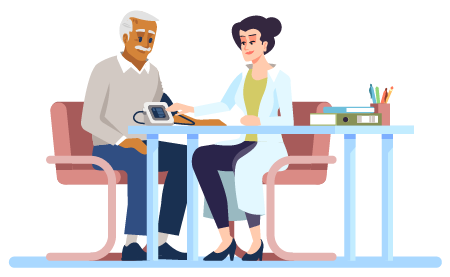Hypertension
High blood pressure or hypertension is a common condition where there is increased resistance to pump the blood out of the heart to the rest of the body. Long-standing hypertension is also called a silent killer as it can cause irreversible damage to the heart and other major vital organs of the body.
Complications
Uncontrolled blood pressure can result in complications such as heart attack, stroke, chronic (long-term) congestive heart failure, kidney disease, and vision problems.
How is Hypertension Diagnosed?
Normal BP: less than <120/<80 mmHg
Elevated BP: 120-129/<80 mmHg
Hypertension: >130/>80 mmHg
For people with a South Asian background, who have chronic conditions like heart disease, diabetes, and stroke, it is recommended to keep your BP lower than 130/80 to decrease the complications of high blood pressure.

Risk Factors You CANNOT Control
- Family history of hypertension in parents and blood relatives.
- Increasing age
- Gender: Men are at a higher risk of developing high blood pressure before the age of 64 and women, after age 65.
- Race: South Asians are at higher risk due to their genetics, lifestyle, and diet.
- Chronic kidney disease
Risk Factors You CAN Control
- Physical activity: 150 minutes of rigorous activity per week has shown to be beneficial in reducing risk of developing hypertension, diabetes and heart disease.
- Diet: Use less than 2 grams of sodium in the diet, eat more fruits and vegetables, and avoid processed foods.
- Avoid alcohol consumption, especially in large quantities.
- Quit smoking and all tobacco products.
- Control your diabetes and high cholesterol.
- Manage stress
Managing High Blood Pressure
- Consult your doctor immediately if you notice an abnormally high BP
- Lifestyle modifications: Sometimes adjusting your diet and exercise can be enough to control your BP
- Low sodium diet
- Exercise at least 150 minutes per week
- Medications: If lifestyle changes are not enough, your doctor will prescribe at least 1 medication to control BP. You must remember to take these medications regularly, as directed by your doctor.
- Monitor your BP with an at-home blood pressure machine and periodically compare it at the time of your doctor’s appointment for accuracy
Consult your doctor before using any alternative therapies. Sometimes, even “natural” remedies can interact with your prescribed medications. DO NOT stop your medications without discussing with your doctor first!
___
References
- American College of Cardiology
- American Heart Association
- WHO statistics on Non-communicable disease
- CDC.gov
